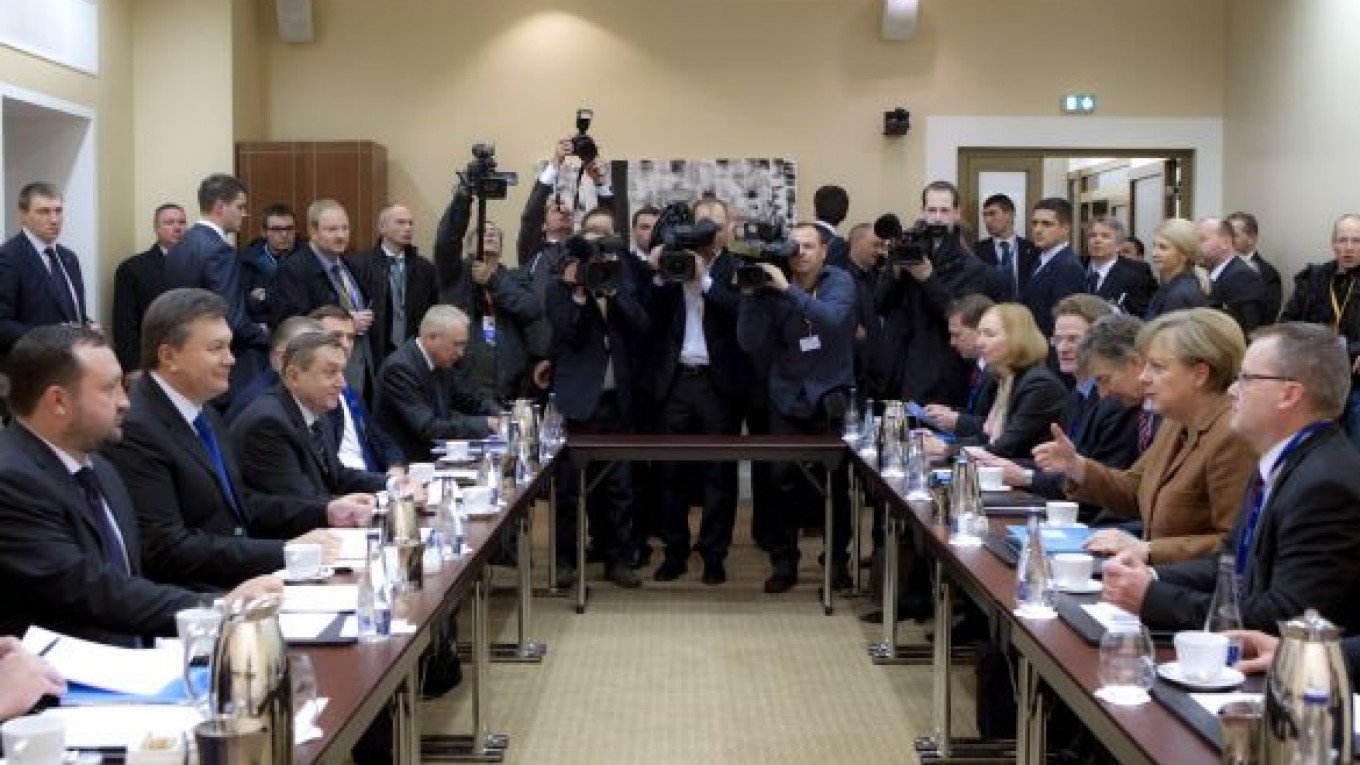More than 100,000 Ukrainians, waving flags and chanting “Down with the Gang!” streamed through central Kiev on Sunday to protest against what they called President Viktor Yanukovych’s broken promises to integrate with the European Union.
The opposition rally, by far the biggest seen in the Ukrainian capital since the Orange Revolution nine years ago, came a day after a police crackdown on protesters which inflamed demonstrators further after Yanukovych’s U-turn on Europe.
In a bid to defuse tensions ahead of the rally, Yanukovych issued a statement saying he would do everything in his power to speed up Ukraine’s moves toward the EU.
In a sea of blue and gold, the colors of both the EU and Ukrainian flags, protesters flooded the streets of central Kiev, angered by Yanukovych’s decision last month to forego signing a landmark EU deal in favor of closer ties with Kiev’s former Soviet master, Russia.
The crowds then moved on to Independence Square, the site of the pro-EU rally that police violently broke up Saturday.
The interior minister warned that police would respond to any disorder and said Ukraine had no place among the ranks of countries like Libya or Tunisia, where popular uprisings overthrew old-guard leadership.
“If there are any calls to disorder, we will respond,” Interior Minister Vitaly Zakharchenko said, Interfax reported.
But riot police, who had sealed off part of Independence Square following Saturday’s crackdown, withdrew as the marchers approached the square.
Opposition leaders including heavyweight-boxing-champion-turned-opposition-politician Vitaly Klitschko, a likely challenger for the presidency in 2015, were due to address the crowds.
Sunday’s rally also marked the anniversary of a 1991 referendum that ushered in Ukraine’s independence from the then-crumbling Soviet Union.
Saturday’s violence, in which police used stun grenades and batons against mostly young and peaceful protesters, was unprecedented in Kiev and attracted sharp criticism domestically and abroad.
“I want my children to live in a country where they do not beat young people,” said Andrei, 33, the manager of a large firm, who declined to give his surname for fear of reprisals against him.
“I am glad we woke up after a ten-year nap,” he said referring to the 2004-05 Orange Revolution, co-led by now jailed former prime minister Yulia Tymoshenko, which thwarted Yanukovych’s first bid at the presidency.
In what was likely an attempt to soothe anger, Kiev’s police chief offered his resignation to the Interior Ministry after taking personal responsibility for riot police’s violence, Interfax reported.
German Foreign Minister Guido Westerwelle called on the Ukrainian authorities to protect the peaceful demonstrators “from any kind of intimidation and violence” on Sunday.
“I will do everything in my power to accelerate the process of moving Ukraine closer to the EU,” Yanukovych said in his statement. He also repeated the need to balance Ukraine’s European integration with its own national interests.
“Ukraine has made its own geopolitical choice. We are a European people and our path has been historically determined. But at the same time, according to my deep conviction, our government should integrate into an association of European nations as an equal partner to be respected,” he said.
Prime Minister Mykola Azarov said in a televised interview late Saturday that Yanukovych would travel to Moscow to work on a “roadmap” for new economic cooperation after a planned trip to China from Dec. 3 to 6, though he gave no dates.
A Message from The Moscow Times:
Dear readers,
We are facing unprecedented challenges. Russia's Prosecutor General's Office has designated The Moscow Times as an "undesirable" organization, criminalizing our work and putting our staff at risk of prosecution. This follows our earlier unjust labeling as a "foreign agent."
These actions are direct attempts to silence independent journalism in Russia. The authorities claim our work "discredits the decisions of the Russian leadership." We see things differently: we strive to provide accurate, unbiased reporting on Russia.
We, the journalists of The Moscow Times, refuse to be silenced. But to continue our work, we need your help.
Your support, no matter how small, makes a world of difference. If you can, please support us monthly starting from just $2. It's quick to set up, and every contribution makes a significant impact.
By supporting The Moscow Times, you're defending open, independent journalism in the face of repression. Thank you for standing with us.
Remind me later.






